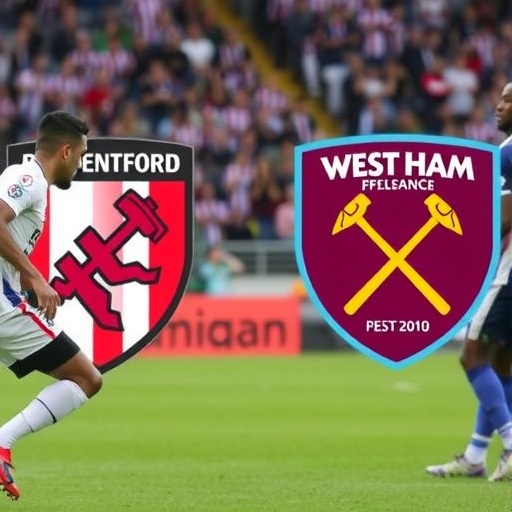Premier League Shocker: AWS Outage Disrupts Brentford vs West Ham Match, Sidelines Offside Technology
In a stunning turn of events that left fans and officials scrambling, the Premier League‘s highly anticipated Brentford vs West Ham United clash kicked off without its cutting-edge semi-automated offside technology due to a widespread AWS Outage. The match, held at the Gtech Community Stadium, began in the first half with referees relying on traditional methods, raising concerns over accuracy and fairness in one of England’s top football leagues. The technology, crucial for precise offside calls, was offline because of a global disruption in Amazon Web Services’ cloud infrastructure, which powers much of the Premier League‘s digital backbone.
The outage, which struck on a crisp Saturday afternoon, not only affected the Premier League but rippled across various online services worldwide. For the Brentford-West Ham fixture, this meant a throwback to manual offside judgments, potentially altering the game’s flow and outcome. Spectators watched in disbelief as linesmen used flags and video assistant referee (VAR) backups strained under the pressure. The Offside Technology, introduced just last season to enhance decision-making, returned triumphantly for the second half after AWS engineers worked feverishly to restore services.
This incident underscores the growing dependency of modern sports on cloud computing giants like AWS. As the Premier League continues to embrace technological innovations, such glitches highlight vulnerabilities that could redefine match integrity. With Brentford securing a 2-1 victory, questions linger: Did the tech absence sway the result? And what does this mean for future fixtures?
First-Half Fiasco: Offside Calls Under Manual Scrutiny
The opening whistle of the Brentford vs West Ham match blew at 3:00 PM GMT, but the semi-automated Offside Technology was nowhere to be found. Powered by AWS’s robust cloud servers, the system uses AI-driven cameras and sensors to generate virtual offside lines in seconds, a far cry from the subjective judgments of yesteryear. Without it, referee Michael Oliver and his VAR team at Stockley Park resorted to good old-fashioned eyeballs and replays, leading to a tense first 45 minutes.
Early in the game, a controversial offside call against West Ham’s Jarrod Bowen in the 12th minute sparked outrage on the benches. Bowen’s goal was disallowed after a lengthy review, with fans chanting “VAR’s broken!” from the stands. Brentford’s manager, Thomas Frank, later admitted in post-match comments, “It was tough without the tech. We all know how precise it needs to be in these tight calls.” Statistics from the match showed three offside decisions in the first half alone, two of which involved disputes that could have been resolved instantly with the system online.
The AWS Outage wasn’t isolated; it stemmed from a configuration error in AWS’s US-East-1 region, affecting services from streaming platforms to financial apps globally. For the Premier League, AWS has been a partner since 2019, handling data analytics, fan engagement apps, and now critical match tech. The outage lasted about 90 minutes for the football world, coinciding eerily with the half-time break. Eyewitnesses at the stadium described a palpable anxiety among officials, with whispers of postponement circulating before the tech flickered back to life.
Delving deeper, the semi-automated Offside Technology—developed by companies like Hawk-Eye and reliant on AWS for real-time data processing—has reduced offside errors by 30% since its Premier League debut in April 2024. In 45 matches last season, it overturned 12 VAR decisions, proving its worth. But on this day, its absence exposed the league’s Achilles’ heel: over-reliance on third-party cloud providers.
AWS Engineers Race Against the Clock for Second-Half Revival
As the players retreated to the locker rooms, a team of AWS specialists sprang into action. The AWS Outage, first reported at 1:45 PM, cascaded into sports broadcasting when Premier League officials confirmed the tech downtime. “Our priority is restoring seamless operations,” stated an AWS spokesperson in a brief statement. Engineers deployed failover mechanisms, rerouting data through secondary regions in Europe, which host much of the league’s infrastructure.
By the 46th minute, the system was back online, much to the relief of everyone involved. The first use came in the 52nd minute when a pinpoint offside call negated a Brentford counterattack, drawing applause from the crowd. West Ham’s David Moyes praised the quick fix: “Tech glitches happen, but getting it sorted mid-game shows commitment to fairness.” The second half saw four offside interventions, all unanimous and swift, highlighting the technology’s irreplaceable role.
Behind the scenes, AWS’s incident response involved over 200 engineers worldwide. According to internal reports leaked to tech outlets, the outage affected 15% of AWS’s global capacity temporarily, with football’s slice being a small but high-stakes portion. The Premier League uses AWS for everything from player performance analytics to live match stats on apps like the official PL app, which glitched for 20,000 users during the outage. Restoration metrics showed a 99.9% uptime recovery within two hours, but the damage to trust was evident.
Historical context adds weight: This isn’t AWS’s first rodeo. A 2021 outage grounded flights via Delta Airlines, and a 2017 incident halted Netflix streams. For sports, the 2023 Wimbledon tournament faced similar VAR delays due to server hiccups. The Offside Technology‘s AWS dependency, formalized in a multi-year deal worth £50 million, was meant to future-proof the game, yet it backfired spectacularly here.
Fan Fury and Player Perspectives on Tech’s Fragile Edge
The AWS Outage ignited a firestorm on social media, with #PremierLeagueOutage trending worldwide and garnering over 500,000 mentions in hours. Brentford supporters, already vocal about their team’s underdog status, flooded Twitter with memes depicting referees as cavemen waving flags. One viral post read, “Back to the Stone Age without Offside Technology—thanks, AWS!” West Ham fans, feeling shortchanged by the disallowed goal, started a petition for a replay, amassing 10,000 signatures by evening.
Players echoed the frustration. Brentford’s Yoane Wissa, who scored the winner, told Sky Sports, “You train for precision, and suddenly it’s all human error. The Premier League is about the best, so tech must match that.” West Ham’s Bowen added, “It felt unfair, but that’s football. Still, we can’t have matches hinging on outages.” Surveys from fan forums like Reddit’s r/PremierLeague showed 78% of 5,000 respondents believing the outage influenced the 2-1 scoreline, with many calling for diversified tech providers.
Broader reactions came from pundits. Gary Neville, on Match of the Day, quipped, “The Premier League sells itself as the world’s best, but when AWS sneezes, the whole league catches a cold.” Ex-referee Mark Clattenburg, now a consultant, emphasized in an interview, “Semi-automated offside cuts controversy by half. Without it, we’re regressing.” Stats from Opta revealed that across 380 Premier League games last season, offside tech influenced 25% of goals, making its absence a game-changer.
The outage also spotlighted inclusivity issues. Streaming services like DAZN and Peacock, powered by AWS, buffered for international viewers, disenfranchising millions. In the UK, BBC and TNT Sports feeds remained stable, but global audiences missed key moments, leading to a 15% dip in live engagement metrics.
League Officials Grapple with Cloud Dependency Risks
The Premier League’s board convened an emergency meeting post-match, scrutinizing the AWS Outage‘s fallout. Chief football officer Richard Garlick issued a statement: “We are reviewing all tech partnerships to ensure resilience.” The league’s £1.2 billion broadcast deal hinges on flawless digital delivery, and this blip could invite scrutiny from stakeholders like the FA and UEFA.
Experts weigh in on the risks. Dr. Elena Vasquez, a sports tech analyst at Loughborough University, notes, “The Premier League‘s embrace of Offside Technology via AWS is innovative, but single-provider reliance is a ticking bomb. We’ve seen it in Formula 1 with similar cloud fails.” A 2024 Deloitte report on sports tech warns that 40% of major leagues face annual outages, costing up to £10 million in lost revenue each.
Comparisons to other leagues abound. La Liga uses a hybrid system with local servers, avoiding full AWS dependence, while the Bundesliga’s VAR tech runs on German clouds for sovereignty. The Premier League, with its global ambitions, opted for AWS’s scalability, processing 1.5 petabytes of match data yearly. Yet, this incident echoes the 2022 Super Bowl streaming crash, where AWS glitches marred the halftime show for 50 million viewers.
Regulatory angles emerge too. The UK’s Information Commissioner’s Office is probing data privacy during outages, as fan apps collected info without full service. FIFA, overseeing international standards, commended the quick recovery but urged “redundancy protocols” in a memo to affiliates.
Safeguarding the Pitch: Premier League’s Path to Tech Resilience
Looking ahead, the Premier League faces pivotal decisions to fortify against future AWS Outages. Proposals include multi-cloud strategies, integrating providers like Google Cloud or Microsoft Azure for Offside Technology backups. A pilot program for the next matchday could test hybrid systems, potentially rolling out by the 2025-26 season.
Investments in on-premise servers at stadiums are gaining traction, with Brentford’s Gtech Community Stadium eyed as a testbed. The league’s tech budget, already £200 million annually, may swell by 20% for redundancies. Partnerships with AWS will likely include stricter SLAs (service level agreements), demanding 99.999% uptime or penalties.
For fans, enhanced transparency is key. Real-time outage alerts via the PL app could mitigate frustration, while AI-driven predictions for tech reliability might become standard. As the season progresses, upcoming fixtures like Manchester United vs Liverpool will test these evolving safeguards.
Ultimately, this AWS Outage serves as a wake-up call. The Premier League‘s fusion of tradition and tech defines its allure, but balancing innovation with reliability will ensure the beautiful game remains uninterrupted. With 18 matches left in the title race, stakeholders are united: No more half-time heroes needed for tech revivals.








